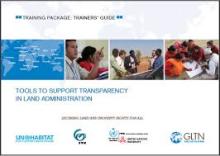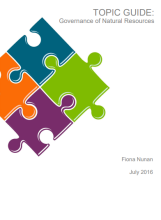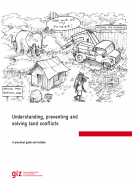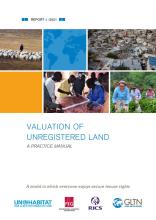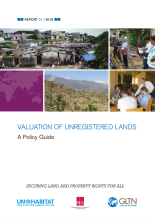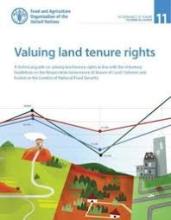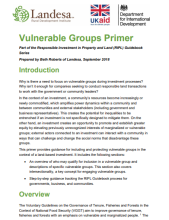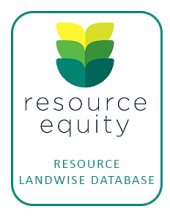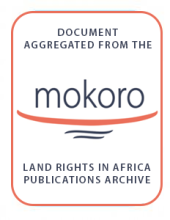Resources for Government
Tools to Support Transparency in Land Administration: Trainer's Guide
This trainer's guide is complementary to this training toolkit. It is part of an approach that aims to sensitize government agents about land administration, develop their capacity to address issues of corruption and to enhance transparency in the land sector. It focuses specifically on land administration with a view to filling the capacity development gap in the land administration sector. Training content covers key themes clustered into different training sessions related to land governance, transparency, land administration and tools that could help bring about transparency.
TOPIC GUIDE: Governance of Natural Resources
This topic guide for government agencies, service providers and other practitioners examines various dimensions of governance that are key to deliver appropriate benefit-sharing, ensure sustainable exploitation, minimise conflict over access and control, and maximise the contribution of resources to economies. This includes decentralised and collaborative governance, multi-level and adaptive governance, and the roles of institutions and politics.
Training Manual - Working on Legitimacy in Land Governance
How state and customary authorities deal with land issues has important consequences for how they are viewed by citizens. This may be particularly the case in conflict-affected settings, where displacement and return cause tenure insecurity and land disputes, and where the legitimacy of state and non-state institutions is contested. ZOA and Radboud University have developed a training manual around legitimacy and land, based on research conducted by Radboud researchers in Uganda.
The training programme presented here helps development practitioners in the land sector to become more sensitive to questions of legitimacy, and to better understand how their interventions in the land sector impact local dynamics of legitimation.
Understanding, preventing and solving land conflicts: A practical guide and toolbox
This guide is intended for practitioners who are confronted with land conflicts in the course of their work or are in a position to prevent them and/or include land governance as one pillar in their policies. It aims to broaden the understanding of the complexity of causes that lead to land conflicts in order to provide for better-targeted ways of addressing such conflicts, and provides a number of tools with which to analyse land disputes. In addition, this guidebook discusses a wide variety of options and tools for settling ongoing land conflicts and for preventing new ones. It adopts a gender-sensitive approach.
Valuation of Unregistered Land – A Practice Manual
Value, and its attribution to unregistered land, is important information for effective land acquisition, taxation and transfer processes and a key component of land administration systems.
This manual presents a practical approach to the valuation of unregistered land. It is designed to aid implementation of Valuation of Unregistered Lands: A Policy Guide, prepared by the Global Land Tool Network for the United Nations Human Settlements Programme (UN-Habitat), in combination with the international valuation standards of the International Valuation Standards
Council. The manual comprises two parts. The first gives an overview of recommendations related to the valuation of unregistered land rights, and the second provides more detail about what to consider when working in this complex environment.
Valuation of Unregistered Lands: A Policy Guide
This guide aims to support the process of valuation of unregistered land and property for the public and private agencies that undertake this exercise. It will be relevant for policy makers, local authorities, international finance institutions, investors, property developers, banks, civil society organisations, citizens, land owners, local communities and women’s groups.
Valuing land tenure rights
This technical guide covers the issues associated with the identification and valuation of tenure rights for different purposes, and provides guidance on how to ensure that valuations are undertaken in a fair, reliable and transparent manner that comply with international norms. It explains why valuations are important, where and when they should be used, and by whom. The guide aims to raise the level of awareness of valuation issues and procedures among those involved in land policy and administration and those affected by land tenure decisions.
Vulnerable Groups Primer (Responsible Investment in Property and Land (RIPL) Guidebook Series)
This primer provides guidance for including and protecting vulnerable groups in the context of a land-based investment. It outlines the importance of identifying and engaging with vulnerable groups, who often have weak claims to land rights and are particularly susceptible to negative impacts from changes in land use. It provides
• an overview of who may qualify for inclusion in a vulnerable group and descriptions of specific vulnerable groups, and
• step-by-step guidance for governments, business, and communities..
Women's Land Tenure Framework for Analysis: Inheritance
This frameworks focuses on understanding the factors affecting women's capacity to inherit land. It is designed to assist anyone who is interested in understanding the complex issues associated with women’s land rights: government officials, grassroots organizations, international technical advisors, policymakers, development practioners, women’s rights advocates, land rights advocates, people who are developing programs to assist women farmers, people who are concerned with food security, etc.
Women, Land and Corruption: Resources for Practitioners and Policy-Makers
Despite increasing attention in recent years, little evidence has been available on the issue of women, land and corruption in Africa to inform effective policy-making. There has been no compilation of relevant background information, lessons learnt and approaches to tackling land corruption as it affects women. This publication aims to address that gap, providing practitioners and decision-makers with a compendium of research findings, contextual information and practical solutions to help fulfil women’s land rights. It presents specifically gendered evidence on how women are affected by land corruption differently from men, followed by responses tailored to women’s needs to address gender-based inequalities over land. Covers Cameroon, Ghana, Kenya, Liberia, Madagascar, Sierra Leone, Uganda and Zimbabwe.


